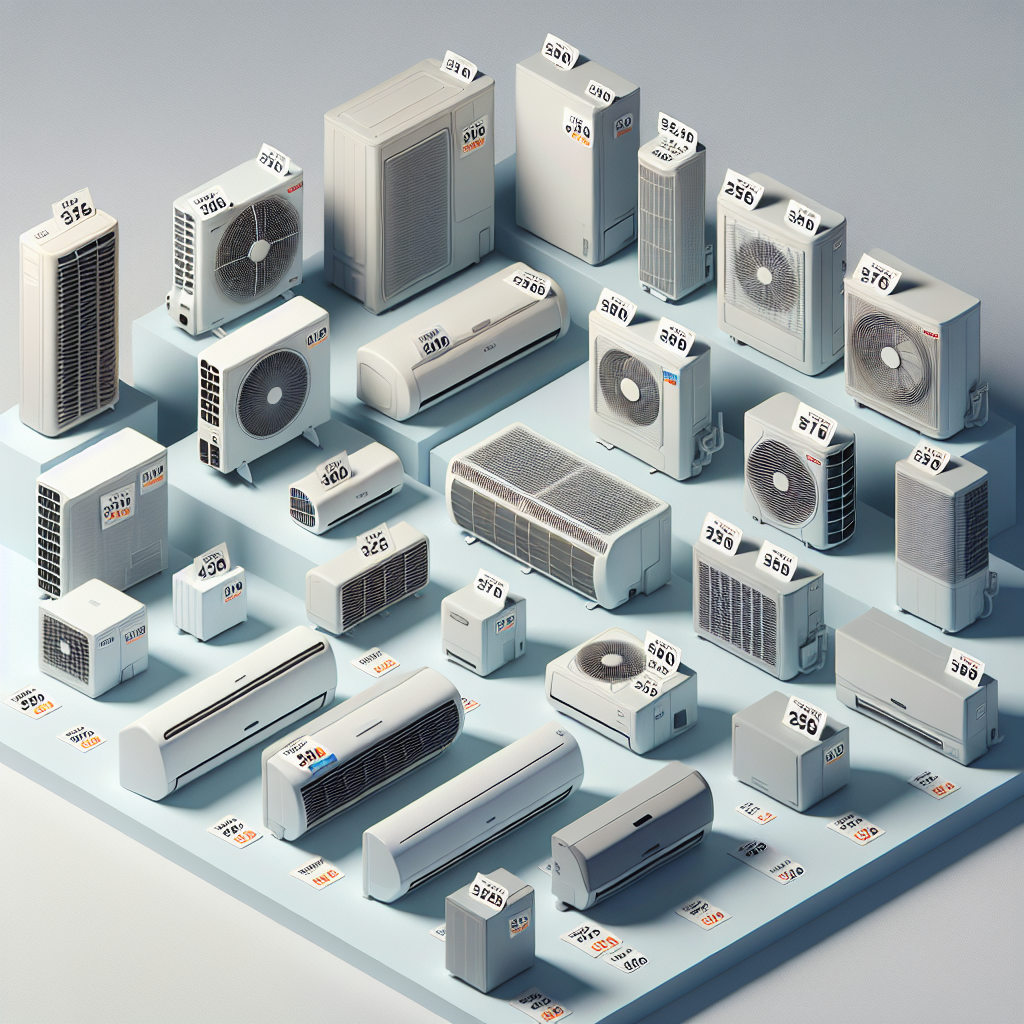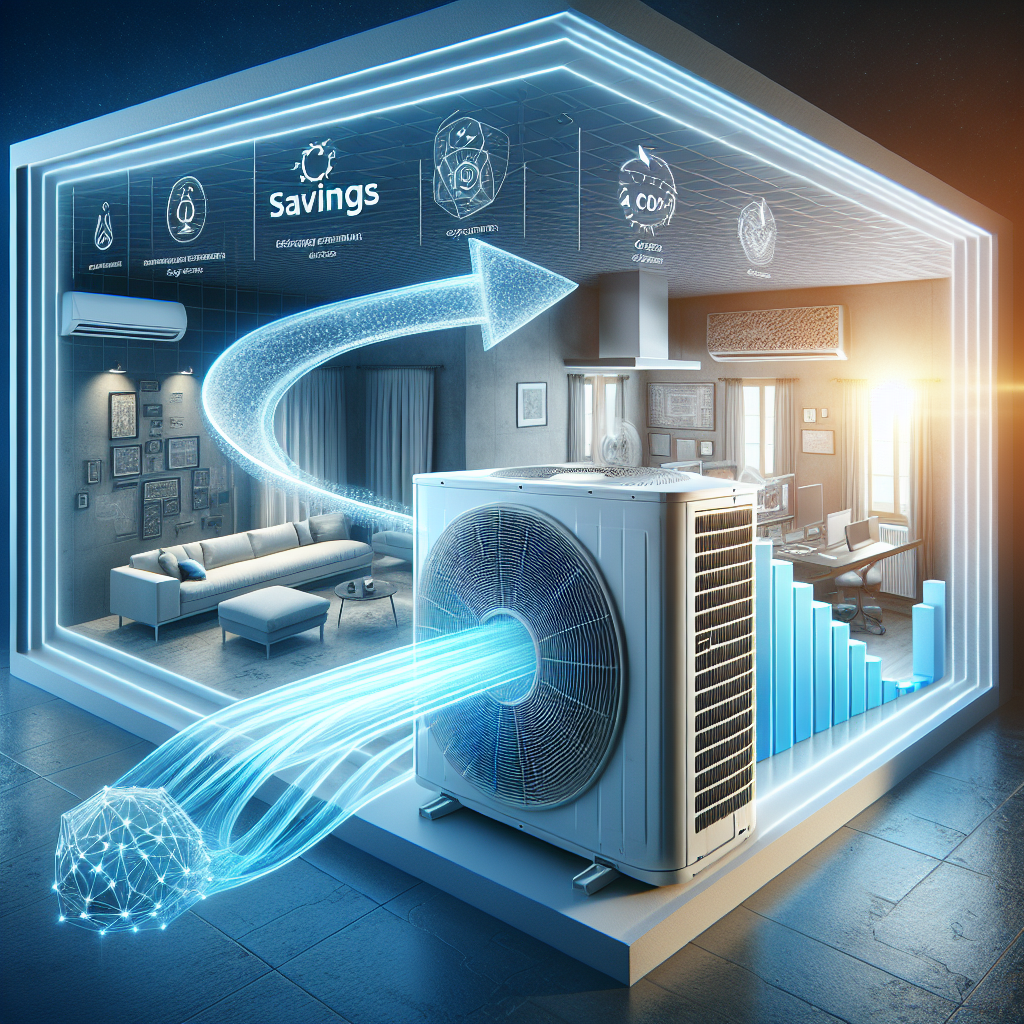If you’re looking to install an air cooling system in your home, the financial aspect is a big piece of the puzzle. Prices can change quite a bit depending on a range of factors, like the kind of unit you decide on.
From central systems to the smaller portable types, each option brings its own price tag, which is important to know as you make your choice.
Generally, window units can start at only a few hundred dollars, while larger central systems may cost thousands.
The brand can also impact air conditioner pricing, often determining what you’ll ultimately pay.
Familiarizing yourself with these aspects can help you stick to your budget while ensuring you choose the best fit for your space. And don’t overlook installation fees, as they can significantly impact the overall AC system cost and air conditioner pricing you may encounter when considering an HVAC unit expense.
Click here to learn more about: prices.html
Understanding AC System Costs
Reflecting on what we’ve discussed about the various price points for your air cooling options sets a foundation for grasping overall expenses. Many homeowners often find themselves surprised by the comprehensive amount tied to setting up and maintaining their cooling systems. It goes beyond just the initial purchase price; various elements come together to shape your total costs.
Installation Expenses
Let’s kick things off with installation fees. These can differ significantly depending on the system type you choose. For instance, while central systems might require a higher compressor price, they usually deliver better cooling for larger living spaces. It’s smart to get an idea of local HVAC pricing to ensure you’re making the best decision for your specific needs.
Maintenance Matters
Now, let’s chat about upkeep. Regular maintenance isn’t merely a box to check; it’s a wise investment for your future comfort. Sure, those maintenance charges might seem like an added cost, but skipping minor repairs can lead to much larger expenses later on. Consider service plans as your safety net for those unexpected issues. Additionally, don’t overlook replacement costs, emergency service rates, and even refrigerant costs when you budget for your HVAC system’s upkeep. Keeping these elements in check can help you manage your HVAC unit expense more effectively.
Energy Efficiency
Also, think about energy efficiency ratings when exploring your options. Models with higher efficiency might have a higher initial price, but they can lead to significant long-term savings on your utility bills. From seasonal maintenance pricing to technician fees for repairs, understanding the full scope of AC system costs will empower you to make informed decisions that benefit both your wallet and your comfort. Don’t forget to look into warranty coverage and ask local service providers about financing options, so you can find budget-friendly choices that still prioritize quality.

What Influences Air Conditioner Pricing
Thinking about installation and maintenance costs brings us to a crucial topic: the different elements that affect air conditioner pricing. Knowing these factors is essential, especially when you’re exploring options that match your needs and budget.
Brand reputation really matters when you’re investing in an AC unit. Well-known manufacturers usually have a higher price tag, but that’s often because of their reliability and the strong warranties they provide, which can give you some peace of mind. Then there’s energy efficiency ratings—you definitely don’t want to overlook these. Yes, going for a more efficient system might make your wallet a bit lighter at first, but the potential for lower utility bills could make it a smart choice down the line.
Let’s get into size as well—it’s super important to ensure your system fits your space correctly. An air conditioner that’s too big or too small can waste energy and lead to higher operational expenses, so it’s worth doing your homework on cooling capacity pricing. Think of it like choosing the right outfit; you wouldn’t wear shoes that are too tight or too loose, right?
Also, keep seasonal demand in mind when it comes to AC systems, especially in hot markets like Houston. When summer rolls in, prices for things like refrigerant and ductwork installation can change, which impacts your total HVAC unit expense. Homeowners should be ready for potential jumps in maintenance charges and emergency service rates that often come with the hotter months.
Factors Influencing Air Conditioner Costs
- Brand reliability can significantly impact pricing, with established brands typically having higher costs due to their proven reliability and warranty options.
- High energy efficiency ratings can result in long-term savings on utility bills, making them a good investment even if the initial costs are higher.
- Selecting the right system size is key; an improperly sized unit can result in wasted energy and increased expenses.
- Seasonal maintenance pricing and other costs like refrigerant and ductwork installation can vary, especially in competitive locations like Houston.
Breakdown Of Installation Fees
Understanding installation fees can be a real eye-opener for your budget, especially when you think about all the elements that impact air conditioner pricing. Knowing what contributes to these costs helps you prepare for the financial commitment and sidestep any unwanted surprises down the line.
Labor Costs
Getting skilled and licensed technicians for your installation is essential. Their knowledge can really make a difference in your HVAC unit expense and ensure everything operates as it should. Typically, service call fees will depend on the technician’s experience and how tricky the installation is. By investing in qualified professionals, you’re likely to save yourself from headaches and unexpected repairs later.
Materials Included
You’ll need a selection of materials for a smooth installation, such as pipes, insulation, and fittings. The quality of these materials significantly affects the total costs and also plays a role in the system’s longevity and overall performance. Choosing better products can lead to improved warranty coverage and lower maintenance charges throughout the years.
Permits and Inspections
Don’t forget to take into account any necessary permits and inspections, which are often needed to follow local regulations. Securing the right permits can help you steer clear of pricey fines and delays. It’s crucial to keep track of these extra expenses along with service call fees and parts and labor charges for accurate budgeting. Ultimately, investing in quality installation sets the stage for energy efficiency ratings and lowers your operational expenses, leading to significant savings over time.
Average Costs For HVAC Unit Expenses
After checking out the factors that influence air conditioner pricing and breaking down installation fees, let’s dive into the typical costs you’ll see for your HVAC unit. Knowing where your money goes can really help you plan your home budget effectively.
Installation costs usually run between $3,000 and $7,500. Model specifications and local HVAC pricing can lead to quite a bit of variation in these numbers. The complexity of the installation is also a big factor—if you’ve got a tricky setup, expect higher expenses.
Repairs can put a dent in your wallet too, with common issues costing anywhere from $150 to $500. It’s important to weigh whether fixing or replacing your unit is the better option, as this decision can impact your long-term costs significantly.
Remember, prevention is key! Regular check-ups are crucial for keeping your HVAC system in tip-top shape. A typical maintenance plan generally costs between $150 and $300 each year. This small investment can help catch minor problems before they turn into big headaches, saving you from those hefty emergency repair costs down the line.
Plus, investing in routine services not only enhances the longevity of your system but also boosts energy efficiency ratings, which can lead to big utility savings over the years. As you manage your HVAC unit expenses, it’s smart to include costs for routine maintenance, service call fees, and repair estimates, since they all play a part in keeping your cooling system running smoothly.
Exploring Replacement Costs For AC
With a clear understanding of installation fees and average costs behind you, let’s focus on a key factor that can really impact your decision: the potential for replacement versus repair of your air conditioning unit. This can be a significant consideration, and understanding the nuances involved will help you make an informed choice.
First off, think about the age of your current system. If it’s around 10 to 15 years old, you might be flirting with the idea of an upgrade. An older unit can struggle with efficiency, ultimately leading to higher operational expenses. You might find it more cost-effective to invest in a new model that offers better energy consumption rates, which in turn can lead to some nice utilities savings over the years.
Brand reliability plays an important role as well. Not all brands are created equal; some stand out for their durability and performance. Doing some research on brand comparisons can show you what models not only fit within your HVAC unit expenses but also promise longevity and reliability, making them a smart long-term investment.
Also, take a moment to think about energy efficiency ratings. These numbers can give you a helpful glimpse into how much you can expect to save in the long run. A unit with high efficiency might have a steep upfront cost but can offer significant cost-saving features that help keep those monthly bills in check.
On the other hand, there are instances when a repair could be the better route. If your system is relatively young and a specific part malfunctions, it might be more budget-friendly to go for a repair instead of an entire unit replacement. Always weigh your options and consider getting a few repair estimates to see what makes the most sense for your wallet.
Ultimately, gathering installation quotes can help you navigate the landscape of air conditioner pricing. Understanding your choices when it comes to replacement costs versus repairs not only keeps your home comfortable but can also fit nicely into your budget.
Maintenance Charges You Should Know
Once you get a grip on how repairs and replacements can weigh on your wallet, it’s key to remember the routine care your HVAC system requires. Keeping your unit in great shape is super important for comfort, especially in the scorching heat of Houston.
Typically, you should set aside about $100 to $200 for a standard service checkup. And you’ll want to do this about twice a year. That’s a small price considering the peace of mind it offers.
Think of it as putting money in your future savings—improving efficiency, cutting down on those pesky utility bills, and adding years to your system’s life. Regular maintenance stops those unexpected breakdowns and expensive repairs, all while keeping your home cozy without emptying your wallet.
Plus, many HVAC companies offer financing options or great promotional packages to help with the regular costs of seasonal maintenance pricing. If you’re looking at central air conditioning expenses, checking out these different plans can help you find a solution that suits your needs while paving the way for potential savings over time.
| Maintenance Frequency | Cost of Routine Service | Benefits of Maintenance | Financing Options |
|---|---|---|---|
| Twice a year | $100 to $200 | Prevents costly repairs | Available from many HVAC companies |
| Improves system efficiency | Investment for long-term savings | Extends system lifespan | Promotional packages may be offered |
How Do Emergency Service Rates Work
When your air conditioning unit fails unexpectedly, understanding the pricing structure for emergency repairs is key. It can make a big difference in how you handle the costs associated with that stressful time. The first thing to note is that most emergency service calls start with a service call fee. These fees can fluctuate based on the time of day—calls in the evening or during weekends usually come with higher pricing. The type of problem, whether it’s a minor fix or a serious system failure, also heavily influences your final costs.
In high-pressure situations, technician fees and parts and labor charges will factor into the total amount you’ll need to cover. If you’re stuck in the sweltering heat with a broken AC system, quick response times can be crucial. Getting help fast not only helps restore your comfort but can also avoid a worsening situation that would lead to higher repair estimates.
It’s also important to consider that many service providers add extra fees for after-hours calls, including weekends and holidays. This can significantly impact your overall bill. To avoid surprises, make sure to ask about any potential additional costs when reaching out for assistance.
By comparing different local service providers, you can get a clearer view of their rates and services. Knowing how the pricing for emergency repairs works, along with recognizing the importance of quick responses, helps you prepare for those unexpected AC breakdowns and keeps your home feeling comfortable.
Evaluating Compressor Price And Quality
After looking at maintenance costs and emergency service rates, let’s focus on a key part of your cooling system: the compressor. When you’re checking out a new AC unit, the investment can feel a bit overwhelming, but we’ll break it down.
AC system cost can vary a lot, usually swinging from a few hundred to several thousand dollars, so it’s important to know what you’re getting into. Also, installation fees can really stack up, so keep those labor rates in mind as you plan your budget.
Don’t forget that the energy consumption rates of different models can have a big impact on your long-term operational expenses. Opting for a highefficiency model could save you a lot on those monthly bills. Choosing the right compressor doesn’t just affect your immediate costs; it shapes how you’ll feel about your energy bills every month.
Quality is super important as well. Going with reputable brands usually leads to better-performing units that last longer and work reliably. These companies often support their products with solid warranty coverage, which can help with expenses like refrigerant costs and filter replacement costs, giving you extra assurance with your purchase.
Investing in AC Systems
- Air conditioner pricing can range widely from a few hundred to several thousand dollars.
- Installation fees can greatly influence your overall budget.
- Energy-efficient models can provide substantial savings on your monthly utility bills.
- Reputable brands typically offer strong warranty options that help cover various costs linked to AC units.
What Are Energy Efficiency Ratings
Getting a handle on energy efficiency can really change the game when it comes to your overall costs. This is especially true after we’ve talked about the investment in quality compressors and those emergency service rates. So, what are these energy efficiency ratings all about? Well, they help you see how well your home is using energy, which directly affects your monthly bills.
The key focus here is on equipment efficiency. When you see higher ratings, it means appliances and systems are using energy more wisely. This can lead to big drops in your residential AC pricing over time. For instance, opting for high-efficiency models can save you quite a bit on utility savings and lighten those monthly expenses considerably.
It’s a good idea to get familiar with the different ratings out there, like the SEER rating for air conditioners or the Energy Star label for various appliances. These ratings really shine a light on the savings you can score by choosing the right equipment. Sure, investing up front in those high-efficiency models might feel a bit extravagant, but believe me, the long-term savings can make it worth every penny.
When you’re considering the AC system cost, remember that the initial price tag can be a small drop in the bucket compared to the utility savings you’ll rack up over the unit’s lifespan. Higher efficiency ratings not only lead to lower operational expenses but also help you live more sustainably. It’s all about making smart choices that will pay off down the road!
Factors Affecting Ductwork Installation Costs
Let’s chat about something that can really affect your home’s comfort—and that’s the costs tied to ductwork installation. Understanding what drives these expenses can help you make smart choices that suit both your budget and your living space.
The size of your home plays a big part in figuring out installation fees; bigger spaces usually need more ductwork, which can really increase those costs. And it’s not just size that matters; the layout of your home also makes a difference. If you have a complex design, expect to see some added labor costs because custom adjustments might be necessary, resulting in higher technician fees.
Next up is the choice of materials. Going for high-quality duct components doesn’t just improve your system’s longevity; it can significantly boost efficiency too. This means potential savings on those monthly energy bills. Speaking of efficiency, regular duct cleaning is super important. Keeping your ducts free and clear not only helps maintain better air quality but it can also make your system work more effectively. So, you can enjoy better airflow while stretching the life of your cooling tech.
Ductwork Installation
- The average cost of ductwork installation can range from $1,000 to $5,000, depending on the size of the home.
- Complex layouts can increase labor costs by 10-20% due to the need for custom adjustments.
- High-quality duct materials can improve system efficiency by up to 20%, leading to lower energy bills over time.
- Investing in durable components can extend the lifespan of your HVAC system, potentially saving thousands in replacement costs.
How Much Does Installing A New Central AC System Cost For Your Home
Why Are AC Prices So High Today


